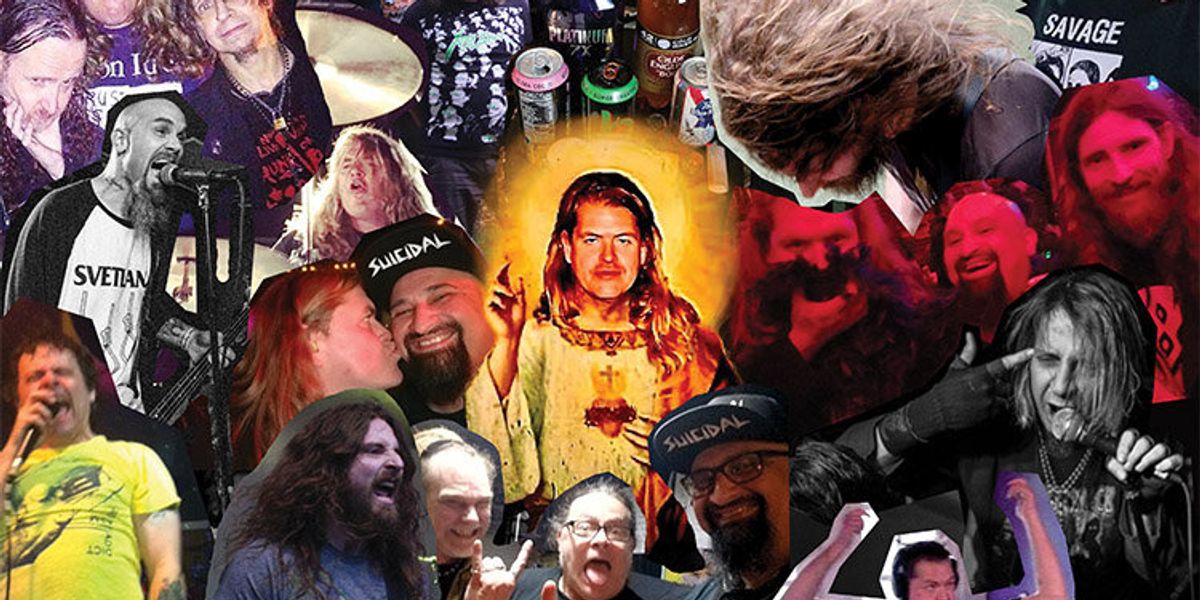A standard-issue modern music gripe, subject of a ton of clickbait articles, is, “why are there no protest songs anymore?”
The answers vary, but the most crucial point is that political criticism laces an incredible amount of modern music. Anyone seriously asking the question needs to stop staring at the MOR entities that pass for mainstream rock or hip-hop. Beyond the mainstream lurks the constant drumbeat of hip-hop’s critiques of racial injustice, punk, and hardcore’s growl against social inequalities. That includes everything from Steven James Adams’ anti-hate song “Togetherness”, Run the Jewels’ party against neoliberalism on “Ooh La La”, and Jessica Moss’ instrumental laments for a melting world with “Glaciers II”Glaciers II”.
It used to be that news formats left sufficient space for music to colonize, but that gap has closed. Politics is now ubiquitous, and there are far more direct ways to make a statement than to shoehorn an obtuse sentiment into eight bars and lines that rhyme. Just last month, everyone from Nicki Minaj to Kayne West, Beyonce to Chance the Rapper offered support to Nigerian protestors against police brutality. Anyone who missed the similar avalanche related to Black Lives Matter must have been blind. By the same virtue, numerous rock acts have protested the use of their music by the Trump campaign, or come out in support of Biden, or supported benefits and so forth.
The internationalization of news is an issue. The old news media was relatively parochial, whereas now we’re all buffeted by a vastly widened span of global issues. It can make it hard to connect emotionally or to avoid feeling overwhelmed. Pussy Riot protested the Russian Orthodox Church or the country’s misogyny. Molchat Doma commented on the post-Communist dictatorship of Lukashenko. The Black Panther soundtrack celebrates African talent. Sometimes, for white Anglo-Saxon audiences, the response can be to disconnect. The charts from 1960 to 1990 were just as full of party-hard fluff as it is now. The protest music moment barely existed. There were so many benefit compilations and events in the 21st century that it’s faded into the backdrop, whereas moments of protest used to stand out because of their rarity. And no one is crying out for a reprise of Band Aid’s “Do They Know It’s Christmas?” (if they are, then there were reprises in 1989, 2004, and 2014).
People seem to be asking for more broad brushstroke anthems, the kinds of songs that feel unifying because they weren’t as precise as modern protest. Much though I adore Rage Against the Machine – and acknowledge that they were articulate on stage, on video, in their actions – it’s fair to say their music was unspecific. “Fuck you. I won’t do what you tell me” is a rallying cry for any place on the political spectrum. U2’s “Pride (In the Name of Love)” and “Sunday Bloody Sunday” were magnificent but referred to decade-old events: by that reasoning, we’re due a tribute to Hans Blix’s efforts in Iraq.
Faced with the vagueness of “Imagine”, “Anarchy in the UK”, “War (What Is It Good For)”, or “What’s Going On”…People want conscience salving gentle references that allow them to feel in on a cause, without having to commit, or in any way question their lifestyle or responsibilities. I’m sure the reason few songs are protesting Trump or Brexit is that they would be banal. There are now far more effective channels for politics and charity – like footballer Marcus Rashford’s efforts to ensure free school meals for British children. It’s also hard to find a musician anywhere near the charts who doesn’t have a political stance.
Nonetheless, if you’re desperate for specifics, Dead End America’s Crush the Machine will salve that ache. The cover pulls no punches: Trump’s face on a snake’s body, a living skull against a backdrop of flame, and a “Department of Injustice” Dead End America badge. The imagery fits solidly into the Prophets of Rage/late-era Rage Against the Machine lineage of stark, slightly cartoony graphics. Of course, there’s no denying there’s never been a more worthy subject for punk hate mail than the self-serving mafia cabal currently serving as President and cabinet of the United States.
Dead End America come with a stellar line-up of punk talent: Steve Hanford from Poison Idea who sadly died this year; Mike IX Williams from Eyehategod; Nick Oliveri of Queens of the Stone Age and every other punk/metal hybrid ever; Blaine Cook from the Accüsed and the Fartz; Tony Avila from World of Lies; Ian Watts from Ape Machine. What is it about politics that requires super-groups and other temporary alignments? There’s a distinct impression that some distance is needed from an individual’s ‘day job’ or that it would seem lame and out of place amid a band’s normal output.


